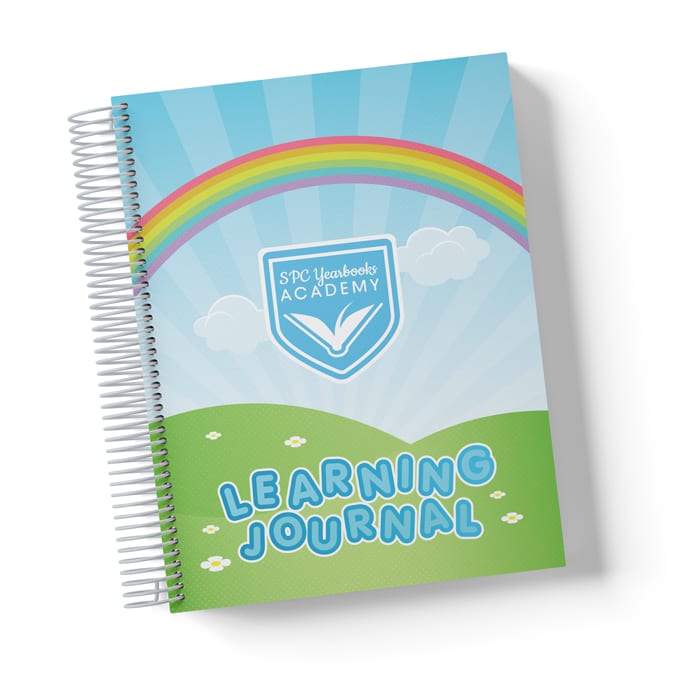Learning journals make it simple to build up a weekly snap-shot of learning and achievement. Making insights into thought processes readily available for parents’ evenings or Ofsted inspections. Schools can use journals in each classroom to encourage independent learning, and the ability to help recognise and apply what has been learnt in everyday life as early as possible. Learning journals are sometimes referred to as a learning log or diary.

Why Use Learning Journals at Your School?
The earlier pupils are introduced to self-regulated learning, i.e. independent work and the independent organisation of the upcoming tasks, the more they will benefit from it throughout their lives. Learning journals make use of cognitive and metacognitive learning strategies.
The subject matter is deepened, the self-directed organisation supported and the development of own ideas on the learning topic encouraged. By regularly dealing with their own journal through entries, students develop independence, personal responsibility and an understanding of consequences.
Learning Journals Provide Improved Insights into Learning Progress
By looking through learning journals, teachers can gain insight into the thought processes and the approach of their students. But it should also be mentioned that this review means additional work, because the entries should be read regularly. The advantage is clear, however. Because also from i.e. shy, calm or difficult to access children you get a better picture of the respective learning progress with the use of learning journals.
The Use of Cognitive and Metacognitive Learning Strategies
Linking the two – cognitive and metacognitive – learning and work strategies ensures that the individual examination of the subject matter is given as well as the best possible use of one’s own resources. Both the own time management and successful motivation techniques should be mentioned here.
Cognitive level (the “WHAT”): On the cognitive level it is about the content, the learning material, the “what did the students learn”? Cognitive learning strategies (repeat, read, research) help to deal with the material to be learned.
Metacognitive level (the “HOW”): Metacognitive learning strategies (time management, motivational strategies) enable learners to independently monitor success through the use of control questions. On the one hand, the objective is to evaluate the understanding of one’s own learning process. On the other hand, it is learning the methods to acquire new information and learning content yourself. The metacognitive level includes planning, review / self-reflection and regulation of the goals to be achieved.
Should I Create Learning Journals Instead of Student Planners?
It might sound like learning journals will work perfectly for your school, but this ultimately depends on the overall learning strategies of your school and to an extent your homework recording strategy. If you need students to write verbose instructions to record homework tasks, it may be difficult to devote enough space in the daily pages to be an effective learning journal. However, if most homework tasks are recorded elsewhere (e.g. email or online) with only a brief note of the task to be recorded in the planner, then a learning journal can replace the student planner very effectively. We can work to help you create the ideal journal and/or planner whatever your strategies and needs.

5 Tips for How to Introduce a Learning Journal into Your Classroom
It is essential to plan an introductory lesson to familiarise everyone with the concept of the learning journal. Ideally, the concept is presented not only to the learners, but also to their parents or guardians.
- Explain the pros and cons of a learning journal versus a student planner or homework diary. Make sure everyone understands the concept and expectations of the school. It should be clearly communicated how often, at what time of day and what is actually to be documented.
- The learners should understand that their journal is not about spelling or grammar, but about shaping and promoting their own academic performance. The advantages of keeping a journal / diary should be clearly in the foreground, especially the importance of being honest with yourself and your own goals and decisions.
- Lessons should be designed in such a way that there is enough time for entries in the journal. The best solution is of no use if the implementation is not taken seriously enough.
- Especially for students with little experience, it can make sense to include key questions to support the thought processes in the design of the individual journal pages. Older students who already have experience with planners tend to benefit from more freedom and less rigid page structures.
- With a flexible page design, you can do much more than written diary entries. Free areas for sketches allow you to use your own personal creativity in the best possible way and help visual learners. Make sure you have an appealing and clear design. We tend to pick up things more often which are simple and engaging.
Reflective learning questions examples are:
- What do I plan to achieve my goals (how do I structure my work)?
- What have I already achieved, where do I still have problems understanding (where do I stand with my plans)?
- What can I do to get closer to my goal? Where can I get support if I have difficulties understanding?
- What do I need to better understand content that has not yet been seated? More practice hours, research on the Internet, teacher coaching or maybe ask a teacher or classmate?
A discussion of the results with a learning coach or teacher should definitely be included in the planning. In this way, negative self-assessments or even emerging feelings of stress can be turned into positive ones.
10 Sample Questions for the Journals or Diaries:
What did I already know about xxxx?
What new things have I learned about xxxx? (Here connections are already recognised)
Did I notice anything in particular about this topic?
Do I know this topic from my own experience, do I have to deal with it in my own environment?
Where will I be able to use this topic in the future?
What have I not yet understood well?
Where will I apply my knowledge in the next few days?
Is there anything else to be clarified or followed up on this topic?
What was my greatest sense of achievement today, what difficulties did I overcome?
What did I enjoy? Where do I notice when I feel uncomfortable, anxious or overwhelmed?
Monthly Pages Capture the Entire School Year
A separate monthly page can be used to illustrate or note what the students liked this month and what wasn’t so good. The journal can serve as a medium to remember the school year. A neat side-effect: These memories can also be used to generate ideas for creating a yearbook.
Start Your Journey with Learning Journals Today!
Unleash Learning Potential: Begin Your Journal Journey Today! Tailored to Your School’s Needs, Explore Our Diverse Page Library for Primary and Secondary Education.